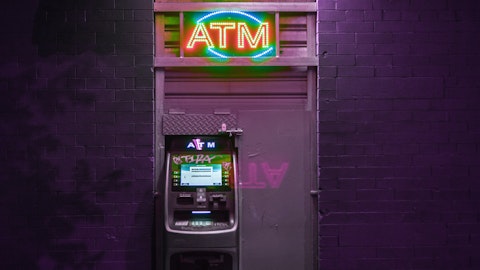David Turner: Yeah. So, let me answer the second question first. So the $25 million per quarter is slightly higher than our historical run rate. Fraud has increased dramatically in the industry. We seem to be the ones calling out. It’s hit us very hard. To your first question, this was a different scheme this time than what we’ve reported on last quarter. And unfortunately, this scheme that they had, you don’t know about until the banks on which the checks are written notify you that that’s not a good item, and it takes about 50 to 60 days before you know that. We can look at when events occurred, and we can kind of see a pattern where we feel reasonably confident that we’re not going to see that kind of increase going forward from the schemes that we’ve seen.
And of course, we’re putting in new controls, we’re putting in new technology, and it’s very disappointing. We have the 25 John, a bit higher. Call it $5 million higher than we historically have had, because this is just a big deal in the industry and so we want to be a bit conservative. We’ll give you better guidance on expenses, including fraud, when we get to reporting on 2024 expectations later, but – so it’s a tad higher, but.
John Pancari: Okay. All right, David. Thank you. And then I guess related to that, any – I mean given this is the second visible fraud issue to come up in as many quarters, are you getting any pressure incrementally from regulators to invest more actively like you said, around these new controls that you’re putting in or any input there? And then separately, on the capital front, you talk about buybacks likely to resume in the near term. Can you maybe give us some color on the timing and potential magnitude there?
David Turner: Sure. So we won’t talk about our relationships with our regulators, but fraud is our issue. If we have to have our regulators tell us what to do with regards to fraud or anything else, we’ve probably already missed that boat. So it’s not a – that’s not an issue. We’re highly disappointed in it. We’re working hard. We have found some people that have committed fraud. They’ve been put in jail. But it’s again, the industry report we saw is up from $17 billion in ‘22 to $25 billion of fraud in ‘24 thus far. So it’s – and ‘23, sorry. So it’s affecting all of us, but it seems to have gotten us at a kind of concentrated in these two quarters. And again, I feel confident we put in controls and we’ll be putting in more and monitoring it going forward.
Relative to capital, yeah, so we’re at 10.3 on common equity tier one. We now have seen the Basel-III end-game proposal. We’ll be going through and providing our comment letter on that, as well as that NPR. We feel confident in kind of where we are relative to that and the implementation timeframe. Hopefully we get a bit of reprieve on that. But even if we didn’t, we feel that we’re in a good place to be able to implement that without too much harm, and there’s no need for us to continue to let our capital to continue to increase. We accrete 20, 30 basis points of capital every quarter. So if we did nothing, we would be pushing on 10.6, that’s just higher than we need. And so we think we can enter into buybacks as soon as we get out of the blackout period.
And what we left in our comments was we would operate close around that 10% CET1 number.
John Pancari: Great. Thanks David. I appreciate it.
Operator: Our next question comes from line of Ebrahim Poonawala with Bank of America. Please proceed with your question.
John Turner: Hey Ebrahim.



